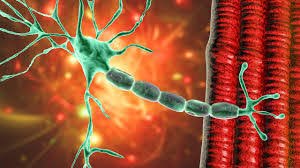Shanghai Zhimeng Biopharma Begins Phase 2/3 Trial of Next-Generation Potassium Channel Opener for ALS
03 November 2025 | Monday | News

Image Source : Public Domain
Previously (in July 2025), CB03-154 received approval from the China Center for Drug Evaluation (CDE) to conduct the ALS phase 2/3 adaptive clinical trial. The CB03-154 has also been granted orphan drug status in the United States in October 2023 for the treatment of ALS.
This phase 2/3 clinical trial is a multicenter, randomized, double-blind, placebo-controlled study with open-label extension. This study is led by Professor Fan Dongsheng from the 3rd Affiliated Hospital of Peking University as the leading investigator nationwide. This study will enroll approximately 240 patients diagnosed with ALS in about 15 centers in China. The disease duration of to be enrolled patients will be within 24 months from the first symptom onset to the screening visit. The primary efficacy endpoint of the study is the change from baseline at week 39 of the revised ALS Functional Rating Scale (ALSFRS-R) score.
Amyotrophic Lateral Sclerosis (ALS) is a progressive and fatal central nervous system disease with unknown etiology. It mainly affects the motor neurons in the cerebral cortex, brainstem, and spinal cord. The pathological features of ALS include the loss of upper and lower motor neuron cell bodies, as well as the degeneration of the corticospinal tract/corticobulbar tract and axons of lower motor neurons, and the occurrence of denervation changes in muscles. Clinically, it mainly presents as progressive skeletal muscle weakness, atrophy, fasciculation, bulbar palsy, and pyramidal tract signs. The median survival duration is generally 2 to 3 years after the onset of symptoms. The main cause of death is neuromuscular respiratory failure. The annual incidence of ALS in Europe and the United States is 2/100,000 to 3/100,000, and the prevalence rate is 3-5/100,000. The peak age of onset is 50 to 75 years. Approximately 10% of ALS patients are familial, while the remaining 90% are sporadic. Currently, there are no treatments that can stop or reverse the progression of the disease. Therefore, clinical management focuses on early diagnosis and early treatment to maximize the survival time. Currently, only three drugs have been approved worldwide for ALS, namely Riluzole, Edaravone, and Tofersen (trade name Qalsody). These approved drugs can only slightly improve the patient's function or slightly prolong the survival time. Therefore, ALS still has a huge unmet medical need.
Although the pathogenesis of ALS has not been fully deciphered, studies have found that it is closely related to changes in ion channels, synaptic transmission and connections, as well as the imbalance of excitation and inhibition of neurons. Among them, the potassium ion (K+) channel is the most widely distributed and has the largest variety, mainly participating in regulating the excitability of neurons and the frequency and amplitude of action potential generation. Currently, there are no marketed KCNQ2/3 potassium ion channel openers available for ALS patients. The only KCNQ2/3 potassium ion channel opener that was approved by the FDA and EMA, ritigabine (Potiga, Ezogabine/Retigabine), was once studied in ALS patients and showed a favorable signal. However, due to the risks of pigmentation-induced vision impairment and other risk factors, it was withdrawn from the market in 2017.
CB03-154 is a new generation selective voltage-gated potassium channel (KCNQ2/3) opener, independently developed by Zhimeng. Compared with the first-generation potassium channel opener ritigabine, CB03-154 has superior selectivity and stability. In vitro studies have confirmed that CB03-154 can significantly reduce the excessive excitation of iPSC motor neurons from ALS patients. Moreover, in the SOD-1 ALS transgenic mouse model, daily oral administration of CB03-154 (10 mg/kg) can effectively prolong the survival time, delay the onset, improve motor ability, alleviate neuronal damage, and slow down the rate of muscle atrophy.
The initiation of this Phase 2/3 clinical trial is a significant step for CB03-154 in the field of rare diseases, and it brought hopes to provide an important new treatment option for ALS patients.
Most Read
- How Does GLP-1 Work?
- Innovations In Magnetic Resonance Imaging Introduced By United Imaging
- Management of Relapsed/Refractory Multiple Myeloma
- 2025 Drug Approvals, Decoded: What Every Biopharma Leader Needs to Know
- BioPharma Manufacturing Resilience: Lessons From Capacity Expansion and Supply Chain Resets from 2025
- APAC Biopharma Review 2025: Innovation, Investment, and Influence on the Global Stage
- Top 25 Biotech Innovations Redefining Health And Planet In 2025
- The New AI Gold Rush: Western Pharma’s Billion-Dollar Bet on Chinese Biotech
- Single-Use Systems Are Rewiring Biopharma Manufacturing
- The State of Biotech and Life Science Jobs in Asia Pacific – 2025
- Asia-Pacific Leads the Charge: Latest Global BioSupplier Technologies of 2025
- Invisible Threats, Visible Risks: How the Nitrosamine Crisis Reshaped Asia’s Pharmaceutical Quality Landscape
Bio Jobs
- Sanofi Turns The Page As Belén Garijo Steps In And Paul Hudson Steps Out
- Global Survey Reveals Nearly 40% of Employees Facing Fertility Challenges Consider Leaving Their Jobs
- BioMed X and AbbVie Begin Global Search for Bold Neuroscience Talent To Decode the Biology of Anhedonia
- Thermo Fisher Expands Bengaluru R&D Centre to Advance Antibody Innovation and Strengthen India’s Life Sciences Ecosystem
- Accord Plasma (Intas Group) Acquires Prothya Biosolutions to Expand Global Plasma Capabilities
- ACG Announces $200 Million Investment to Establish First U.S. Capsule Manufacturing Facility in Atlanta
- AstraZeneca Invests $4.5 Billion to Build Advanced Manufacturing Facility in Virginia, Expanding U.S. Medicine Production
News











